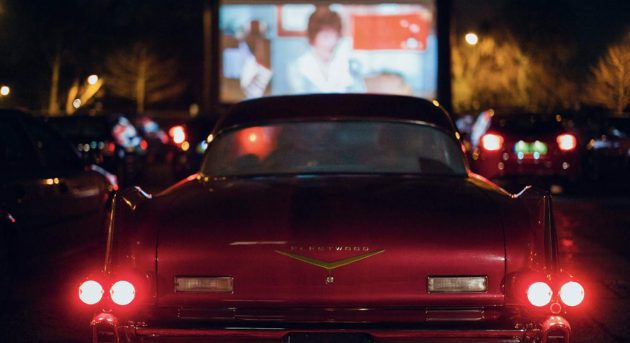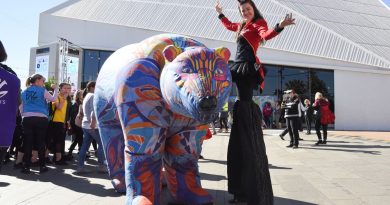Rural Theatre – A safe way forward?
Rural theatre and drive-in theatres in Australia began to decline in the 1970s and 1980s, whilst on the other side of the world in the UK, audience attendance for professional shows in rural venues has been growing steadily over the last years. Now with COVID-19 thrown into the equation, many are expecting rural theatre to make a comeback throughout the world in an unprecedented way.
What was it that made rural theatres so popular in the UK before lockdown interfered?
The format generally used in the UK, is those theatre companies who tour rural areas work with promoters, many of whom are volunteers, who are responsible for their local village hall or similar rural venue. The promoters are part of the local community life, and not only represent the community but also bring the community along to the performances. A list of different professional shows that are touring the area is sent to the promoters. This could be anything from theatre, music, comedy or dance. The promoters then pick the shows they think would work best in their area.
The National Rural Touring Forum (NRTF) estimates that there are some 1600 promoter groups across England, Wales and Scotland, who all together work some 100,000 hours per year to bring theatre to their locality. There are even promotor groups with many members under 25 years of age, who represent the interests of the younger audience. The work that these promoters plays an important role in contributing to increasing audiences in rural areas.
As rural theatres are community-based, they bring a community together. They offer people a night out with family, neighbours and local friends. Not everyone in the audience may be a great theatre lover, but the opportunity for an evening out and a chat with their neighbours add to the evening. This has the added benefit of bringing more people to a performance than might otherwise make the effort.
Many people enjoy the fact that they can experience high-quality performances on their doorstep. It saves time, money and effort. It makes it possible for parents or the elderly to attend. People who might find the journey to a city too much effort, or too expensive, especially for those who need to add on such things as babysitting costs on top of everything else.
Profit goes not only to the performers but also to raise money for the local community, not just via ticket sales but the hire of the venue and volunteers often running a small bar. The audience knows they are helping with the longer-term financing of something they and/or their loved ones will benefit from.
A rural setting can sometimes create an opportunity to meet the performers and perhaps share a drink and a chat with them. A village hall is far more intimate than a concert hall, which means that the audience is usually closer to the performance. They are perhaps more relaxed on their home turf and thus able to enjoy the performance more. There is an intimacy, and performer/audience interaction is easier with friendly heckling/banter being possible (especially when a member of the audience is involved with something on stage).
Rural theatre has often been used to convey a message or help with the development of a local community. Charities and organisations, for example, use the medium of theatre to bring across messages to rural communities in third world countries. Social development and awareness can be better received through theatre rather than through dictates and rules. It provides information in a friendly, non-threatening manner and encourages a local community to discuss problems they face. It is easy to get a health care issue through to a rural community in Africa, for example, via rural drama rather than by books and schooling. Research has shown that theatrical performances have reduced cases of deaths due to preventable diseases and opened debate on harmful traditional practices such as female genital mutilation in communities.
Post-evaluation results from rural theatres have shown a people hitherto timid and apathetic, waking up to articulate their problems and charting a course towards overcoming them. It also proved community theatre as the most popular of all environmental education approaches. Communities get involved and local energy and creativity are unleashed and harnessed for the development of the rural communities in different ways.
Meanwhile, back in England and you will find the Chew Valley Performing Arts, which has been set up “to promote, maintain, improve and advance education and appreciation of the arts in all forms among the people and communities of the Chew Valley and the surrounding area.” Set up as a charity, one of their patrons is Michael Eavis who is the founder of the Glastonbury Festival of Contemporary Performing Arts. The world-famous festival began in 1970 as a rural event on his farm in Pilton, Somerset. Glastonbury Festival did not make a profit for several years, but when it did Michael began to look for good causes to support, both locally and internationally. Today each festival aims to raise £2 million in aid of Greenpeace, Oxfam and WaterAid, as well as hundreds of local causes.
Rural areas deserve to share the energy and creativity generated by the performing arts, Eavis said.
OPPORTUNITIES FOR PERFORMERS
From the point of view of the touring company, rural theatre gives more opportunity to perform their work. It also means the performer can test out their material before hitting the big time in the cities, honing their craft as country folk had entertainment brought to them. Travelling the country they can give many performances of a play, to many different audiences. It offers then the opportunity to develop more flexibility and skills, to perhaps work something local into the performance which the local people will love.
Scripts can be adjusted to a local setting; comedians can pick up on a local issue to air it via humour. Take the example of Boom Chicago, a theatre in un-rural central Amsterdam, the Netherlands, where an English-language comedy troupe perform topical sketches, improvisations and songs. Often touching on sensitive political issues via humour, it gives release and invites conversation. An American comedian doesn’t just make Trump-related puns but has a good dig at Dutch politicians as well. That same comedian might well work some specific humour if they were performing in a ‘buurthuis’ (village hall) in a Dutch farming community, where a sketch about the ‘boerenprotest’ (farmers protest) that took place with tractors holding up motorway traffic over the last two years would be very fitting.
NEXT STAGES FOR RURAL PERFORMANCES
Rural theatre offers creative thinking. In Scotland someone came up with the idea of The Screen Machine; an amazing solution for rural theatre. The Screen Machine is a huge arctic lorry whose main body folds out into theatre seating for some 50 people, with the stage being the flatbed of the lorry. All enclosed and weatherproof. Locals and tourist on the Hebridean island of Mull might be treated to an adaptation of “Whiskey Galore”, which is set on a fictitious Hebridean island. A perfect play for the setting! The Screen Machine has adjusted to COVID-19 rules and regulations so they can tour the Highlands and Islands of Scotland bringing cinema to local communities.
Meanwhile, the NRTF is looking to explore, support, and inspire a programme they are calling the Rural Touring Arts in Libraries across the UK as part of a two-year project. In October they will be hosting a four-day digital conference for all its members across the rural touring sector. One day will be dedicated to Libraries and Rural Touring to explore culture and creativity in Libraries and the benefit of rural touring collaborations with libraries.
Back down under, in similar way, the Australian Regional Performing Arts Touring program, which supports performing arts in reaching regional and remote communities across Australia recently announced grant opportunities for rural theatre. As they say, “Although the arts and cultural industries, along with all Australians and communities around the world, have experienced incomparable disruption from the impacts of COVID-19, we have never lost sight of the enormous public value of the arts for all Australians.
It is important that we resume our programs and strive to enable creativity to continue to connect us in recovery and in the future; it will be essential for Australia’s recovery. Our creative sector will be indispensable in helping to rebuild communities and our economy to assist navigating Australia’s path out of the crisis.
Throughout September and October 2020, The Australia Council are inviting people to engage with them via their online portal and through a series of public town hall discussions. They have been researching the impacts of COVID-19 and the changes needed to re-ignite arts and cultural activity across the country. The dialogues are one of their responses where they are asking two big questions are:
- What do we want the arts and cultural industries to look like in 2030?
- How do we get there?
They plan to use the information to help them determine priorities and are calling upon members of the arts and cultural industries, present and emerging, to reflect, discuss, and act. The discussion paper written advance of the dialogues can be found at www.australiacouncil.gov.au/programs-and-resources/re-imagine-what-next/
In the first months of COVID-19’s arrival, countries mostly implemented blanket lockdown. Now a second wave has arrived there is a movement to lockdown only the regions that have COVID-19 cases, keeping other areas cautious, but not housebound. This means performing locally is safer planning, as it distributes the risk. The cast and crew might not be local, but if they adhere to strict hygiene regulations then rural theatre could make a very fast comeback.
By the 1990s rural theatre and drive-in theatres in Australia had dwindled enormously. But more Australians are expected to visit the drive-ins at any time since the 1970s as they adjust their lives to strict social distancing. With cinemas likely to remain closed and authorities warning social distancing could become a way of life for quite some time yet. This means we need to rethink temporary and take longer-term measures. Settling into the backseat of a car while tuning in to the movie via radio might be the next big trend in 2020 and beyond. In the same way, rural and local theatre venues might offer a way out for live performances to continue.




